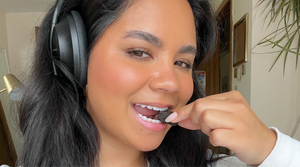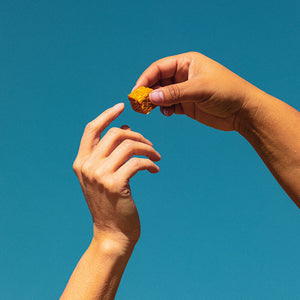With summer solstice behind us we can officially say that summer has started, and it’s expected to be a hot one: scientists are predicting this July, August and September to have above average temperatures (1). If you’re lucky enough to have air conditioning...we’re jealous. If you’re like us spending the summer months with the windows open, head in the refrigerator, and fans on full blast, this article is for you.
Heat exhaustion occurs when your body is unable to cool itself in high temperatures, and it is more likely to occur in conjunction with strenuous activities (fanning yourself included). Symptoms include heavy sweating, faintness/dizziness, low blood pressure, nausea and more, and when left untreated, heat exhaustion can turn into heatstroke, a life-threatening condition.
Luckily, heat exhaustion is preventable with a few easy measures. When enduring the summer heat, be sure to wear loose/lightweight clothing, drink plenty of liquids, and rest during the hottest part of the day (2). Additionally, proper nourishment can help keep heat exhaustion at bay when spending the day outside. Read on for the hot-weather nutrient essentials...
Electrolytes
Electrolytes are minerals in the body with an electric charge, and they support many vital functions, particularly within our nervous and muscular systems. Additionally, electrolytes help regulate blood pressure and volume to ensure proper circulation of oxygen-rich blood.
Our body has developed a few mechanisms to regulate its temperature, sweating being the most obvious. When sweat evaporates, it lifts heat from our skin, helping to keep us cool. However, excessive sweating can lead to the loss of important electrolytes, such as sodium, potassium and chloride.
Electrolyte loss associated with excessive sweating can lead to heat cramps (cramping in the large muscle groups of the legs) and heat exhaustion (3). The best way to avoid electrolyte loss is through hydration. While sports drinks are a quick and easy source of electrolytes, they can often be high in sugar. Instead, opt for sodium-enriched coconut water as a healthy, and nourishing option.
Magnesium
Magnesium is both a mineral and electrolyte with extraordinary importance to our health: magnesium is necessary for more than 300 biochemical reactions, and assists in our nervous system, bones, and cardiovascular system (4). When we experience heat exhaustion or heatstroke, our pulse increases significantly as our heart goes into overdrive to keep our body cool. Magnesium helps support a healthy heart when put under strain. Additionally, magnesium plays an essential role in heat acclimation and body temperature regulation (5). When venturing out on a hot day, be sure to fuel up on magnesium-rich foods such as avocado, bananas, leafy greens and nuts and seeds. Each GEM daily bite contains 50% DV of magnesium to help you reach your daily needs.
Potassium
When it comes to heat exhaustion, electrolytes really are the name of the game, potassium being one of them. Potassium is vital for muscle contractions, and a deficiency (often due to excessive sweating in the case of heat) can lead to heat cramps, or sudden, uncontrollable contractions of the muscles (6).
The bottom line
It’s clear that minerals, particularly in the form of electrolytes, are essential for avoiding and recovering from heat exhaustion and heatstroke. Rather than focusing on individual electrolytes, we recommend filling your plate with nourishing and hydrating foods. Before your next summer outing, reach for pineapple, celery, cucumber and watermelon, all of which are incredibly hydrating and full of powerful antioxidants and electrolytes.
P.S. Be sure to take your daily GEM before heading out in the sun, as the astaxanthin in each of our bites acts as a natural SPF. Of course, we recommend doubling up on sunscreen as well.
Sources:
1. https://www.nytimes.com/2020/06/18/climate/summer-weather-prediction.html
2. https://www.mayoclinic.org/diseases-conditions/heat-exhaustion/symptoms-causes/syc-20373250
3. https://healthyeating.sfgate.com/loss-electrolytes-hot-day-1293.html
4. https://ods.od.nih.gov/factsheets/Magnesium-HealthProfessional/
5. https://pubmed.ncbi.nlm.nih.gov/9793804/
6. https://www.healthline.com/nutrition/potassium-deficiency-symptoms#section3






